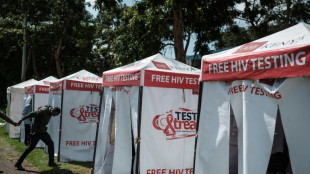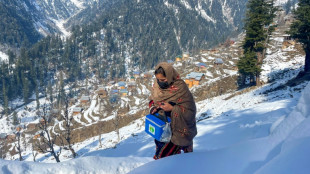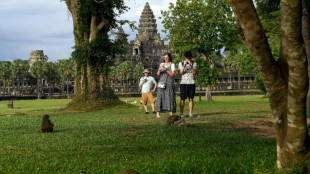
-
 WHO worker aims to raise $1 bn to cover US pullout
WHO worker aims to raise $1 bn to cover US pullout
-
Tesla sales fall in Germany as Musk backs far right

-
 US trade gap swells as Trump renews scrutiny of deficits
US trade gap swells as Trump renews scrutiny of deficits
-
M23, Rwanda troops launch fresh east DR Congo offensive

-
 International backlash after Trump proposal to take over Gaza
International backlash after Trump proposal to take over Gaza
-
'People are going to die': USAID cuts create panic in Africa

-
 Hermoso pressured to downplay kiss, brother tells Spain court
Hermoso pressured to downplay kiss, brother tells Spain court
-
MotoGP champion Martin breaks hand and foot in Malaysia crash

-
 US trade gap swells in 2024 as deficits under fresh scrutiny
US trade gap swells in 2024 as deficits under fresh scrutiny
-
Aga Khan: five things about the prince of sport

-
 Rubio sees Guatemala leader keen to please US
Rubio sees Guatemala leader keen to please US
-
Swedish king leads mourning after school massacre

-
 US Postal Service halts China suspension after stoking trade fear
US Postal Service halts China suspension after stoking trade fear
-
Steel decline sparks protests and a movie in Belgium

-
 Root 'crucial' for England ahead of Champions Trophy, says skipper
Root 'crucial' for England ahead of Champions Trophy, says skipper
-
Chelsea star Kerr 'feared for my life' during taxi ride

-
 India's Rohit insists struggles 'nothing new' ahead of England ODIs
India's Rohit insists struggles 'nothing new' ahead of England ODIs
-
Even in career twilight, Ronaldo's star undimmed at 40

-
 Barca avoiding 'excuses' after Real Madrid ref complaints: Flick
Barca avoiding 'excuses' after Real Madrid ref complaints: Flick
-
Australia fear rank turner for second Sri Lanka Test

-
 EU seeks new import fee on e-commerce packages
EU seeks new import fee on e-commerce packages
-
Oscars frontrunner 'Emilia Perez' suffers awards season crash

-
 Swedish police say school killing spree gunman likely shot himself
Swedish police say school killing spree gunman likely shot himself
-
Stocks, dollar drop as tariff tensions intensify

-
 Oil giants TotalEnergies, Equinor reduce low-carbon investments
Oil giants TotalEnergies, Equinor reduce low-carbon investments
-
Kremlin calls Zelensky's readiness for Putin talks 'empty words'

-
 Trump bid to take over Gaza, move Palestinians faces backlash
Trump bid to take over Gaza, move Palestinians faces backlash
-
Liverpool's Slot not a fan of in-stadium VAR announcements

-
 Stiff competition awaits as Vonn hunts gold in world super-G
Stiff competition awaits as Vonn hunts gold in world super-G
-
Pakistan health workers kick off polio drive despite snow

-
 Austria's Puchner tops second downhill training at world champs
Austria's Puchner tops second downhill training at world champs
-
Bid to sell Suu Kyi's Myanmar mansion flops for third time

-
 Aga Khan: racehorse billionaire and Islamic spiritual leader
Aga Khan: racehorse billionaire and Islamic spiritual leader
-
China slams US 'suppression' as trade war deepens

-
 Sri Lanka's Karunaratne to bow out of Tests after 'fulfilling dream'
Sri Lanka's Karunaratne to bow out of Tests after 'fulfilling dream'
-
Philippine House votes to impeach VP Sara Duterte

-
 Tokyo police bust alleged prostitution ring targeting tourists
Tokyo police bust alleged prostitution ring targeting tourists
-
Baltics to cut Soviet-era ties to Russian power grid

-
 Iraq's famed 'hunchback' of Mosul rebuilt brick by brick
Iraq's famed 'hunchback' of Mosul rebuilt brick by brick
-
Stock markets stutter as traders weigh China-US trade flare-up

-
 Hamas rejects Trump proposal to take over Gaza, move Palestinians
Hamas rejects Trump proposal to take over Gaza, move Palestinians
-
MotoGP champion Martin taken to hospital after Malaysia crash

-
 YouTubers causing monkeys to attack tourists at Cambodia's Angkor Wat
YouTubers causing monkeys to attack tourists at Cambodia's Angkor Wat
-
Sweden reels from worst mass shooting in its history

-
 India's Modi takes ritual dip at Hindu mega-festival
India's Modi takes ritual dip at Hindu mega-festival
-
Nissan shares fall as reports say Honda merger talks off

-
 US Postal Service says suspending parcels from China
US Postal Service says suspending parcels from China
-
Toyota announces Lexus EV plant in Shanghai

-
 Santander reports record profit for third straight year
Santander reports record profit for third straight year
-
No new clothes: S. Korean climate activist targets hyperconsumption


Peru ends Lima curfew aimed at quelling protests
Peruvian President Pedro Castillo on Tuesday announced the end of a curfew in the capital Lima aimed at containing protests against rising fuel prices following crisis talks with Congress.
"We will with immediate effect remove this immobility (curfew). We call on the Peruvian people to be calm," said the leftist leader, alongside Congress president Maria del Carmen Alva.
Police and soldiers patrolled the largely empty streets of the capital earlier Tuesday after Castillo announced the curfew shortly before midnight on Monday for Lima and the neighboring port city of Callao.
It was due to last until midnight on Tuesday as authorities attempted to curtail protests against rising fuel and toll prices amid growing economic hardship.
But news of the curfew's end was met with cheers by hundreds of protesters outside Congress and in other parts of the capital, AFP journalists noted.
"The people did it!" said opposition legislator Alva on Twitter.
Shops and schools were closed and bus services mostly suspended but many workers, at hotels or hospitals for example, ignored the shut-down, which was widely criticized on social media.
The measure took many in Lima by surprise, given that the most violent protests in recent days took place far from the capital.
Many had no choice but to take a taxi or walk to their place of work.
"It was a very late and improvised" announcement, complained Cinthya Rojas, a nutritionist who waited patiently for one of the handful of buses still running to get to work at a hospital east of Lima.
A hotel employee told AFP she had to pay the equivalent of $8, a small fortune on her salary, for a taxi to work.
Some tourists had difficulty finding food, with restaurants and supermarkets closed, but domestic and international flights continued as normal from Jorge Chavez airport, its concessioner said.
Residents of some Lima neighborhoods beat pots and pans at their windows in protest against the lockdown at noon.
- Soaring food prices -
"The measures taken, like those taken yesterday, are not against the people but in order to save the lives of compatriots," said Castillo, balked by the first social protests of his eight-month-old presidency.
He had said the curfew move was "to reestablish peace" after countrywide protests amidst biting food inflation.
"There was information from a source that there were going to be acts of vandalism today. That is why we have taken this step," Defense Minister Jose Gavidia said earlier on Tuesday.
While Lima was under curfew, protests continued and roads were blocked in several smaller cities elsewhere in Peru.
Like much of the rest of the world, Peru's economy is reeling from the damages wrought by the coronavirus pandemic.
The country's Consumer Price Index in March saw its highest monthly increase in 26 years, driven by soaring food, transport and education prices, according to the national statistics institute.
In an attempt to appease protesters, the government over the weekend eliminated the fuel tax and decreed a 10 percent increase in the minimum wage from May 1.
But the General Confederation of Workers of Peru (CGTP) -- the country’s main trade union federation -- considered the measures insufficient and took to the streets again Monday in Lima and several regions in Peru's north.
Some protesters set fire to toll booths on highways, looted shops and clashed with police.
Others burned tires and blocked the north-south Pan-American highway, the country's most important artery for people and goods.
The disruptions halted public transport and closed schools on Monday.
"Social protest is a constitutional right, but it must be done within the law," Castillo, a 52-year-old former rural school teacher, pleaded during his brief TV appearance late on Monday.
- 'Authoritarian measure' -
Two-thirds of Peruvians disapprove of Castillo's rule, according to an Ipsos opinion poll in March.
Castillo's announcement of a curfew came a week after he escaped impeachment by Congress, where opponents accuse his administration of a "lack of direction" and of allowing corruption in his entourage.
It also coincided with the 30th anniversary of a coup staged by ex-president Alberto Fujimori, jailed over his regime's bloody campaign against insurgents.
"The measure dictated by President Pedro Castillo is openly unconstitutional, disproportionate and violates people's right to individual freedom," tweeted lawyer Carlos Rivera, a representative of Fujimori's victims.
Political analyst Luis Benavente told AFP the curfew was "an authoritarian measure" that revealed "ineptitude, incapacity to govern."
A large proportion of Lima's 10 million residents work in the informal sector, as street sellers and other traders, meaning the curfew left them without income for the day.
A Copa Libertadores football match between Peruvian Club Sporting Cristal and Brazil's Flamengo, which had been thrown into doubt, would go ahead as scheduled on Tuesday night in Lima, regional governing body CONMEBOL said on Instagram.
O.Bulka--BTB
